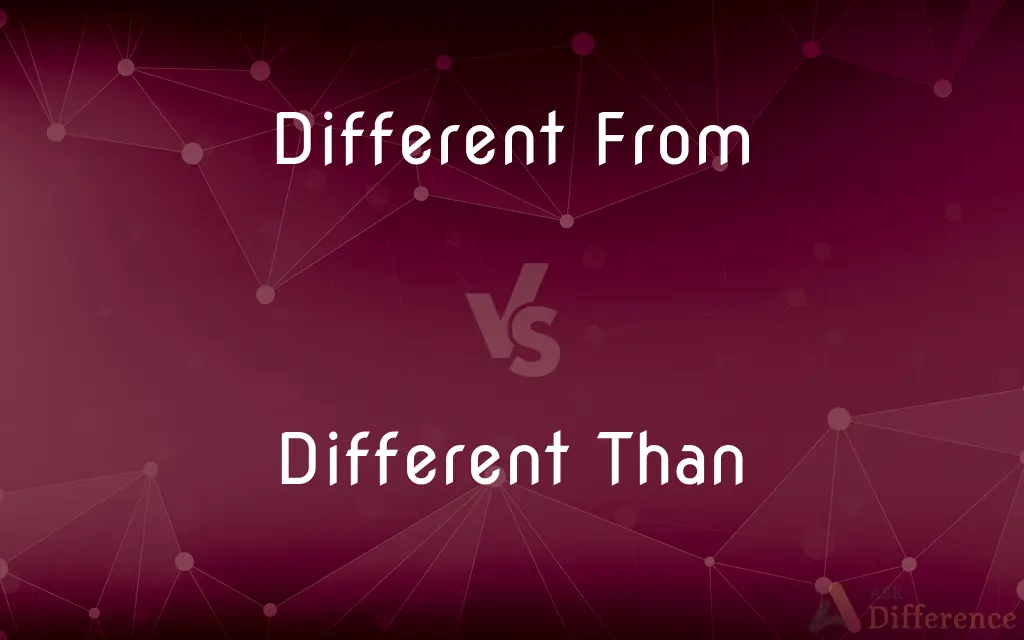Different From vs. Different Than — What's the Difference?
By Tayyaba Rehman — Published on November 7, 2023
"Different from" and "different than" convey variance, with the former predominantly used in British and American English and the latter primarily in American English for comparisons.

Difference Between Different From and Different Than
Table of Contents
ADVERTISEMENT
Key Differences
"Different from" and "different than" serve to elucidate distinctions between entities or concepts. "Different from" is widely accepted in both British and American English and is employed to highlight dissimilarities, as in, "My method is different from yours." On the other hand, "different than" is principally used in American English and often precedes a clause, exemplified by, "The conference was different than we expected."
Utilizing "different from" allows for a direct comparison between two entities, placing them side by side to illuminate disparities. When one says, "Your solution is different from mine," a straightforward juxtaposition is established, identifying each solution as disparate. Alternatively, "different than" often leads into an explorative explanation or comparison of how things are distinct, especially when followed by a clause, as in, "The results were different than anticipated," which may lead to detailing how the results varied.
The flexibility of "different from" makes it widely applicable in various contexts, being especially useful in instances where a succinct, direct comparison is desired, such as, "Her approach is different from the traditional one." Contrarily, "different than" offers a pathway into extended comparison or exploratory discussion about distinctions, inviting further explication following the initial statement of difference, which could be framed as, "This software is different than what’s typically used in the industry."
When considering grammatical strictness, "different from" might be perceived as traditionally accurate, being deployed in both American and British English with a history of widespread acceptance. However, "different than" has carved out its space within American English, providing a variant that allows for unique syntactical structures and flow within sentences. For instance, "The design is different from the initial draft," may seem more structurally conservative compared to the more conversational, "The final version is different than what we first designed."
Both "different from" and "different than" hold utility and applicability in the English language, with the key to effective usage lying in understanding their respective syntactical and regional applications. Navigating through communicative contexts becomes smoother when one harnesses "different from" for direct comparisons and "different than" to pave the way for expanded, contrastive discussion, especially within American English contexts.
ADVERTISEMENT
Comparison Chart
Regional Usage
Used in both British and American English
Predominantly used in American English
Grammatical Application
Directly compares two entities
Often precedes a clause
Example Usage
"My answer is different from yours."
"The scenario is different than expected."
Contextual Flexibility
Offers a succinct, straightforward comparison
Opens a pathway for expanded discussion about differences
Conventional Adherence
Traditionally accepted in both American and British English
Perceived as more colloquially American in application
Compare with Definitions
Different From
Variation Highlight
The color is different from what I remember.
Different Than
Anticipatory Contrast
It tastes different than you’d expect.
Different From
Distinctive Properties
The texture is different from that sample.
Different Than
Inviting Elaboration
The technique is different than what’s conventional.
Different From
Entity Dissimilarity
Your answer is different from mine.
Different Than
Leading into Clause
This product is different than what we discussed.
Different From
Direct Comparison
This flavor is different from the usual.
Different Than
Preluding Explanation
The outcome is different than what was predicted.
Different From
Contrasting Concepts
His method is different from hers.
Different Than
Extended Explanation
The method is different than I initially thought.
Common Curiosities
Can "different from" and "different than" be used interchangeably?
Generally, but "different from" is universal, while "different than" is mainly American and often precedes a clause.
Is "different than" considered informal?
Not necessarily, but it's often used conversationally in American English.
When should I use "different from" over "different than"?
Use "different from" for direct comparisons and when catering to a British and/or American audience.
Can "different than" imply a need for further explanation?
Yes, it often invites further contrast or elaboration.
Is "different from" acceptable in American English?
Yes, "different from" is accepted in both American and British English.
Can "different from" precede a clause?
It can, but "different than" is commonly used in this way in American English.
Can "different than" be used in professional settings?
Yes, particularly in American English contexts.
Can "different from" introduce a contrasting clause?
While possible, "different than" is typically used to introduce contrasting clauses in American English.
Is "different than" recognized in British English?
It might be understood, but "different from" is the standard usage in British English.
Is "different from" used in British English?
Yes, "different from" is standard in British English.
Should I avoid using "different than" in formal writing?
It’s accepted but consider your audience; "different from" might be preferred in formal British English.
Can "different from" denote a distinct separation between entities?
Absolutely, it directly contrasts two entities or concepts.
Does "different than" find usage in scientific writing?
It can, especially in American English, but clarity is paramount, so choose based on sentence structure.
Should I always elaborate after using "different than"?
Not always, but it does naturally lend itself to further explanation or contrast.
Is "different from" more grammatically conservative?
It might be considered so and is broadly accepted in various English-speaking regions.
Share Your Discovery

Previous Comparison
Market Segmentation vs. Target Market
Next Comparison
Inertial Mass vs. Rest MassAuthor Spotlight
Written by
Tayyaba RehmanTayyaba Rehman is a distinguished writer, currently serving as a primary contributor to askdifference.com. As a researcher in semantics and etymology, Tayyaba's passion for the complexity of languages and their distinctions has found a perfect home on the platform. Tayyaba delves into the intricacies of language, distinguishing between commonly confused words and phrases, thereby providing clarity for readers worldwide.













































